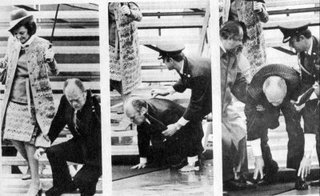 Against Hagiography: The Relevance of Gerald R. Ford
Against Hagiography: The Relevance of Gerald R. Fordby Frank Dwyer
In 1970 Representative Gerald R. Ford (R-MI) led a movement in the House to impeach Supreme Court Justice William O. Douglas on the grounds that Douglas had published an article in the "pornographic" Evergreen Review.
That's my favorite Ford moment, even better than the typically earnest, forthright way he liberated Poland, all by himself, in his 1976 campaign debate with Jimmy Carter.
In fact, Ford obligingly liberated more than Poland, revealing an eerily (though blessedly smirkless) George W. Bush-like grasp of the Terra Incognita beyond his Grand Rapids bailiwick. "There is no Soviet domination of Eastern Europe," the Babbitt of Grand Rapids told a surprised and presumably grateful nation, "and there never will be any under a Ford administration."
Wow. That's a really good Ford moment, too: he didn't only bump his head on helicopters. But it was the hot-button Whip Douglas Now episode that delighted me then and has remained one of my favorite sightings, in the pages of American history, of the not-so-rare Boobus Americanus. Gerald R. Ford, defender of Truth, Justice, and the American Way. There he was in all his glory: anti-liberal, anti-Constitution (he justified his attack on Douglas by claiming that an impeachable offense was whatever Congress said it was at the time, which is almost exactly what Humpty Dumpty told Alice in a similar situation), anti-literature, anti-culture, anti-dissent, anti-art, anti-nudes (there were, I have to admit, a few arty nude photographs in that issue of the Evergreen Review: I had to see them for myself, purely in the service of defending America, just like my colleagues across the aisle).
When he called for Douglas's impeachment, Ford was either a typical Republican political hypocrite, playing to his easily-riled moron base, or (and this is worse) he was sincere, thereby revealing himself to be truly, deeply, incontrovertibly stupid.
People are either qualified by intelligence and some basic level of information (and ideally some basic level of decency) for public office, or they aren't. Most aren't. (Which reminds me: why aren't liberals demanding that Silvestre Reyes step down from his new chairmanship of the House Intelligence Committee? Imagine how we'd all be howling if a Republican chairman couldn't say whether Al Qaeda was "predominately" Sunni or Shia.)
Judging Gerald R. Ford by what he knew about Soviet domination (as he presided over the end of the hottest part of the cold war), or what he knew about the Constitution (as he went after liberal Justice Douglas's political scalp), he apparently didn't even have "the necessities" to represent Grand Rapids, much less lead the nation.
He looks pretty good now, of course, for the same reason he looked pretty good back then, compared to the man he replaced or our hapless Decider. ( But is this comparison altogether fair to Bush? One reason Bush looks so bad today is that he let himself be guided by those two now fully-metastasized machiavels, Rumsfeld and Cheney, that he inherited from Ford!)
How good for us was Ford? What verdict will history render on his Presidency? Over the next few days, as we break away occasionally from the evidently irresistible proto-American total immersion in sanctimonious eulogy and sappy hagiography, we might want to consider whether all the intoning newsreaders are right. He made his own French toast! He was the best athlete ever to hold that high office! But was he, was this comparatively decent, amiable, unmonstrous, non-criminal, "healing" nonentity, really just what this country needed after Nixon. Really? And was his sincere conviction that "our long national nightmare" ended with him, was that, in fact, true. I don't think so. I think the heartbreaking pardon of Nixon has actually worked to prolong our national nightmare, one way or another, to the end of time. Americans need accountability, justice. (Look how Ford's poll numbers plummeted after his profile-in-courage pardon.) Americans need to believe in the institutions of their government. Most of all, they need to believe that the same law that applies to them applies to everyone, even CEOs, even Presidents. Do you think that most Americans believe that now?
Would the trial, conviction, and incarceration of Richard Nixon have torn us apart? Really? But we were already torn apart. It's funny how the Grand Old Party that has, in general, such a soft spot for executions and harsh sentences was so sure the Nixon pardon was "good for us." What about the "deterrent power" of swift and sure punishment that was usually so important to them? Isn't it possible that Nixon's mug shot, perp walk, prison fatigues-that the thought of him working in the prison library, say, or the kitchen, patiently doing his time for his crimes-isn't it possible all that would have reminded future presidents that they too were bound by the rule of law? Isn't it possible that Nixon's example would have made them think twice before committing their own high crimes and misdemeanors?
Healing. It's such a lovely notion. Nixon in jail might have been a true prescription for healing this country, healing all of us, one by one, and truly ending the long national nightmare. But however useful it might have been for "closure," it would surely not have been necessary as a deterrent. Surely not. Surely no American president, in the long wake of Watergate, would ever again allow himself to participate, say, in the wiretapping of the rival party's campaign committee, and then lie about it and cover it up. Surely not.
Our long national nightmare isn't over, not yet, but there may be light--a surge of light-at the end of the tunnel.

No comments:
Post a Comment